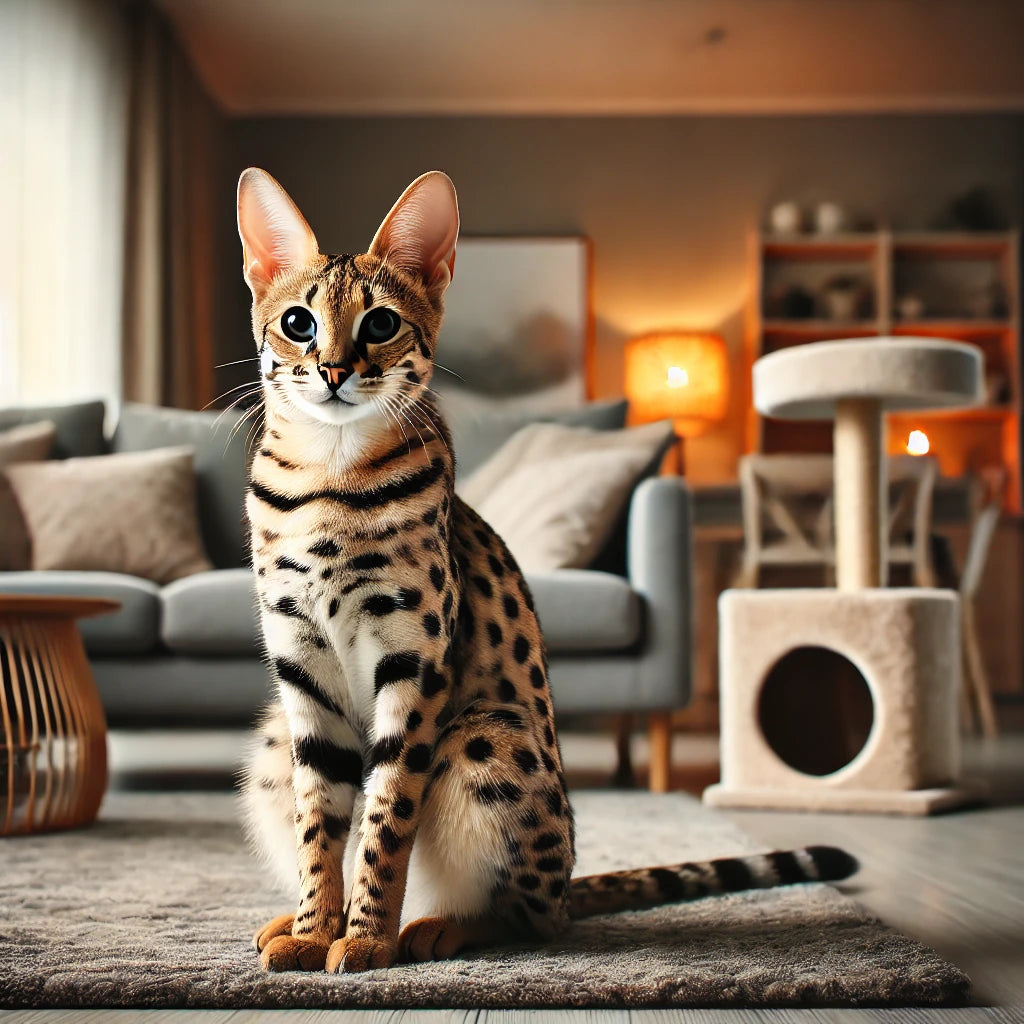
Are Savannah Cats Dangerous?
Share
Savannah cats are an exotic, captivating breed loved by many for their wild appearance and playful personality. However, their unique lineage, a mix between a domestic cat and an African serval, often leads to questions about their safety. Are Savannah cats dangerous? Let’s explore their behavior, characteristics, and the precautions you can take to ensure a harmonious bond with your furry friend.
What Are Savannah Cats?
Origins of Savannah Cats
Savannah cats originated in the 1980s when breeders began crossing domestic cats with servals, a medium-sized wild African cat. The result? A stunning, energetic breed that quickly captured attention worldwide. Savannah cats are categorized into generations (F1, F2, F3, and so on), depending on how closely related they are to their serval ancestors.
Physical Appearance
With their striking spotted coats, long legs, and large ears, Savannah cats resemble miniature cheetahs. Their wild look often draws comparisons to dangerous animals, but appearances can be deceiving.
Are Savannah Cats Dangerous?
Behavior and Temperament
Savannah cats are not inherently dangerous. They are intelligent, energetic, and curious animals, much like other active cat breeds. Their behavior largely depends on their generation and upbringing:
- F1 and F2 Generations: These are closer to their wild serval ancestors and may exhibit more pronounced wild traits, such as independence and a preference for space.
- F3 and Later Generations: These cats are more domesticated, with behavior more similar to typical house cats.
Misconceptions About Savannah Cats
Some people believe Savannah cats are aggressive or difficult to handle. However, they are generally friendly, playful, and loyal, often bonding deeply with their owners. Aggression in Savannah cats is rare and typically a result of improper training or lack of socialization.
How to Safely Live With a Savannah Cat
Tips for Training and Socializing Your Savannah Cat
Savannah cats thrive in homes where they receive plenty of attention and mental stimulation. Here’s how you can create a safe and nurturing environment:
- Early Socialization: Start introducing your Savannah kitten to various people, pets, and environments as soon as possible.
- Positive Reinforcement: Use treats and praise to reward good behavior. Avoid punishment, as it can create fear and mistrust.
- Interactive Playtime: These cats are highly active and need plenty of exercise. Invest in toys, climbing trees, and puzzles to keep them engaged.
- Proper Training: Teach basic commands like “sit” and “stay.” You can even train them to walk on a leash!
Providing a Safe Space
Ensure your Savannah cat has a designated area in your home where they can retreat if they feel stressed or overwhelmed. This could be a quiet room with their bed, litter box, and toys.
Are Savannah Cats Legal?
Legal Considerations
Before bringing a Savannah cat into your home, check your local laws. Some areas have restrictions or bans on owning hybrid cats, particularly F1 and F2 generations. Always research and obtain the necessary permits if required.
Final Thoughts: Should You Get a Savannah Cat?
Savannah cats are not dangerous if raised and cared for properly. They are loving, intelligent, and playful pets that thrive in the right environment. However, they are not for everyone. Their energy and needs can be overwhelming for first-time cat owners or those looking for a low-maintenance pet.
If you’re ready for the commitment, a Savannah cat can bring excitement and joy to your life. Just remember: training, socialization, and attention are key to fostering a positive relationship with this extraordinary breed.
FAQs
Are Savannah Cats Dangerous Around Children?
Savannah cats are generally safe around children, especially later generations like F3 and beyond. However, as with any pet, supervise interactions to ensure both the cat and child are comfortable and safe.
Do Savannah Cats Get Along With Other Pets?
Savannah cats can coexist peacefully with other pets if introduced properly. Early socialization is key. However, due to their high energy, they might intimidate smaller pets like birds or hamsters.
Are Savannah Cats Hard to Care For?
While not necessarily harder to care for than other cats, Savannahs require more attention and stimulation. Their intelligence and energy mean they need interactive play and mental challenges to prevent boredom.
Do Savannah Cats Bite?
Like any cat, Savannah cats may bite if they feel threatened or scared. Proper training and socialization can minimize this risk.